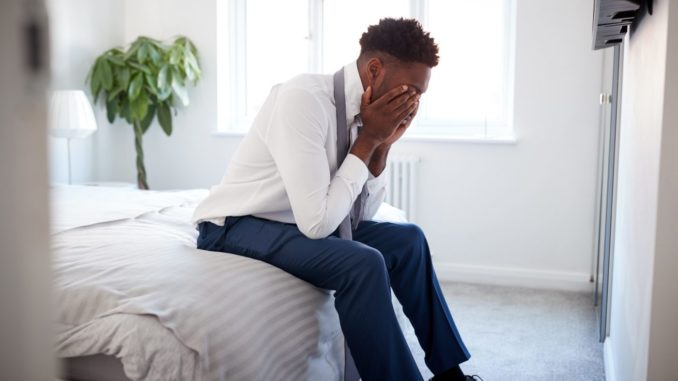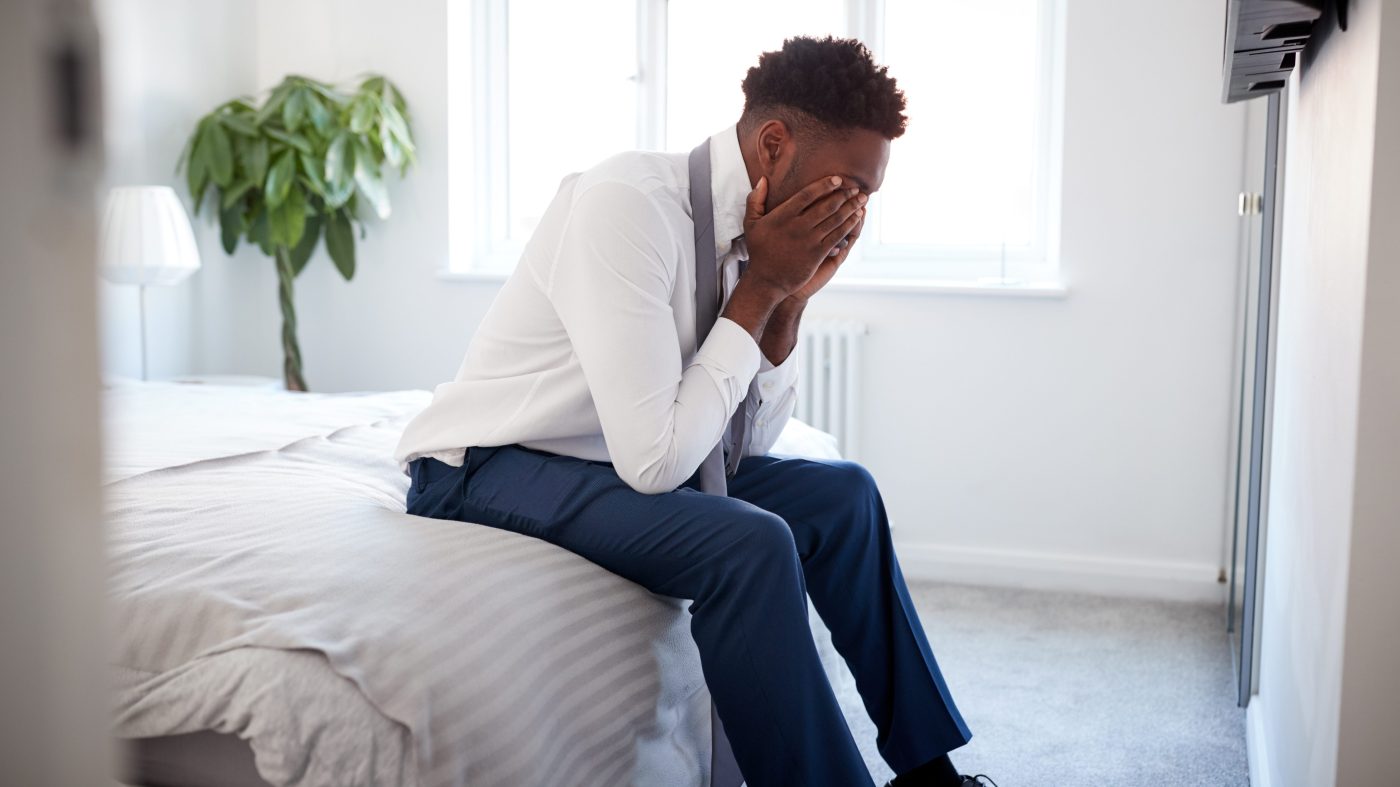

We need more mental health professionals who look like us to get the help we need, says the Black Mental Health Alliance
Every day we’re greeted with the latest coronavirus toll. We hear of the rise in confirmed cases. We get updates on the roiling financial markets and other mortal threats to the economy. We learn how many people have died.
Each alert feels grimmer than the one before. So, lately we’ve started to hear of a different toll. It’s the toll COVID-19 is taking on our sense of stability, our emotional well-being, our mental health.
Mental health experts are addressing these widespread anxieties in online chats. At his daily briefings, New York Gov. Andrew Cuomo is giving people the number for a hotline manned by mental health professionals who’ve volunteered to talk “about what you’re feeling and what stress you’re feeling.”
These are all good and necessary steps for difficult and uncertain times. But they may not be reaching African Americans who were already disproportionately weighed down by the heavy burdens of stress. According to a study by the National Institutes of Health, “African American men continue to underutilize mental health treatment and have the highest all-cause mortality rates of any racial/ethnic group in the United States.”
Jonathan Shepherd, chief medical director of Hope Health Systems in Baltimore and board president of the Black Mental Health Alliance, said that even before the current crisis, African Americans were dramatically less likely than the general population to seek out mental health treatment. “Black people will not go to a physician or to a provider if they cannot find somebody who looks like them, or [somebody] who can understand what they are going through,” he said.
Shepherd talked to The Undefeated about why so many in the black community who are anxious about the coronavirus pandemic are among the least likely to talk it out with mental health professionals.
This interview has been edited for length and clarity.
What were you seeing in terms of African American mental health pre-coronavirus?
The state of mental health in the black community is one of a mixed bag, truthfully. It’s one of growing information and acceptance, but it’s progressing very slowly. There’s just a general cultural mistrust of mental health professionals and health care professionals that is common among African American communities.

BLACK MENTAL HEALTH ALLIANCE
Some of that comes because we’re less likely to receive an accurate mental health diagnosis than our counterparts, white Americans, and that really stems from the fact that there aren’t enough mental health professionals who look like us, or who understand our plight. And because others will misdiagnose what we’re going through as far as depression and anxiety.
When I was a resident in Chicago, there was this woman I was treating and someone had diagnosed her with a psychotic disorder because she heard the voice of God. This woman was of strong faith and she told her provider that God was speaking to her, and he thought that she was psychotic and he even started her on an antipsychotic drug that was causing her all types of side effects. I understood that she was not hearing voices but that was part of her faith belief and was able to stop the medication, and she actually started doing much much better.
The state of African American mental health is one that is progressing toward understanding the importance of mental health, but one that has to still dispel the stigmas and the cultural mistrust.
What are the factors affecting how African Americans utilize mental health services?
If you look at the National Alliance on Mental Illness, they have a statistic that says approximately 30% of African Americans with mental illness will receive treatment each year compared with the U.S. average of 43%.
That comes in part because of the lack of mental health professionals who look like them. But No. 2, you have issues where, within the African American community, we tend to have a larger unemployment rate and those living paycheck to paycheck who can’t afford health care insurance.
Sometimes you are not able to get those benefits that include mental health services even though you have a job. Some of them may be required to go through their employee assistance program, and they only provide a limited number of sessions. If you have a true disorder, that may last for a year or years, and EAP may only allow you to go for five sessions. With five sessions, you may just be getting warmed up enough to develop a rapport and then you run out of those services. One of the biggest things that Obamacare was beginning to correct was to allow parity so those people who may have mental health disorders were not discriminated against, and have their insurance rates be higher and they were allowed to have more services, more sessions provided.
So if that was what things looked like before the coronavirus, what are you seeing now?
Let me tell you, I’m seeing it. I saw it at least two-three weeks ago. The increase in anxiety is off the charts. I know that’s not a technical term, but anxiety disorders, the fear of the unknown — we don’t know how long this is going to last and reports continue to come out. There’s a lot of mixed messaging from our government officials, which is really confusing people. The president just went on his platform saying he wants to open the government back up in weeks when health care officials are telling you this thing might last for months. So there’s mixed messages and people don’t know who to believe, so the anxiety is much higher.
When you have increased anxiety, people are not able to function, they are not able to eat, they are not able to sleep. They become more irritable, even more aggressive. You’re also going to see more depressive episodes because of the social distancing. I tend to like the term physical distancing as opposed to social distancing because this is not the time to social distance. This is the time where we need each other.
There was a statistic that showed that a person who isolates themselves from others is comparable to a person who smokes 15 cigarettes a day in terms of the side effects of isolation. People of color tend to be a very social people and distancing disrupts our organizations, where we find many of our identities and how we identify ourselves, such as in churches and faith-based organizations. Churches are used to meeting on a weekly basis, at least. Other organizations such as fraternities and sororities are used to having their organizational meetings at least monthly. So now you’re telling people they cannot go attend these events, they cannot feel a part of a community where they feel accepted and where many of them truly find their identity. So that is one of the biggest challenges that has arisen with the coronavirus infection.
What was the Black Mental Health Alliance doing to ramp up literacy and utilization in black communities before the pandemic, and what’s happening now?
Our job is to provide education and consultation, so we are on the frontlines in this area. For instance, we would hold Emotional Emancipation Circles. These are like group therapy sessions, that are being held within a community, that have a community leader. It was born out of our call to action in 2015 in response to the Freddie Gray crisis and the uprising in Baltimore.
This particular modality of group therapy is a safe space where people of color can come to talk about the different issues that pertain to their communities and their families. And it’s strictly meant for people of color. We have a long-standing group that continues to meet on the West Side of Baltimore.
In addition to that, we do what we call shop talks, where each month we’re going into barbershops and beauty salons and talking about mental health issues that pertain to the black community. My family actually came in one time, me, my father and my brother, and we talked about how burnout affects you mentally, financially and even physically, so we talked about the mind, body and soul. We talk about depression, suicide, anxiety, we really try to cover all those areas that plague our communities.
With the coronavirus, I have taken to social media and to the airwaves providing every other day updates that provide clear information, dispelling myths. I’m encouraging people to stay encouraged. And I’m providing advocacy measures so that people can know how to contact their elected officials to push for measures that people of color are not left out when it comes to issues related to small businesses collapsing, which again causes people to have more mental health issues because they do not know where they are going to get their money from.
On the radio waves, I’m the co-host of a program called The Spirit in Mind and for the last two weeks we’ve been dealing with the psychology of pandemics. I work with a pastor and he provides a spiritual component of how people can increase their faith during this time where fear has overtaken and gripped us. I step in to provide the mental health component in terms of what we need to do to reduce our anxiety, such as limiting media exposure, meditation, and other techniques that we need to practice on a daily basis to reduce some of this anxiety and fear.
At the Black Mental Health Alliance, we’re in the process of developing a tele town hall meeting within the month. We need to provide resources. We may not have all the answers, but at least we can provide the assistance and help give the strength that people are looking for so that they can continue to move forward past this. I’m also looking to do a Facebook Live with a colleague who is a pediatric nurse practitioner, and one of the things I would like to discuss with her are the effects of the pandemic on children.
What would you tell black communities about mental health and how we should be coping with the coronavirus?
There are a couple of things I would point out. Black people, people of color, are resilient people. We know how to deal with crisis and tragedies. We will bounce back from this. But what I understand is that the world that we live in has now changed.
When we bounce back, we need to be ready for the change. We need to have our business in order, we need to make sure that we are saving as much as possible. We need to make sure we are practicing wholeness for our mind, body and spirit.
This young lady from my church was talking on Facebook about how [her family] used to go to Outback restaurant every week and she used to complain but, ‘Now I wish we could just go back.’ What I understood from her was to say that we don’t appreciate the life that we have now. And when those benefits are stripped away from us, it shows us that we need to really appreciate what we have currently, and to make sure that we’re practicing those things that will continue to build us up so that when times of crisis come, we have something to fall back on.
That means practicing things that will build up your physical body, things that will build up your mental health, and things that will build up your soul — your spirit man, as they say in the church.

Be the first to comment